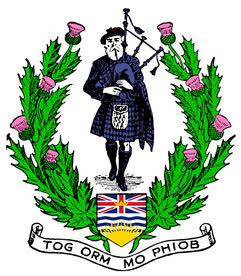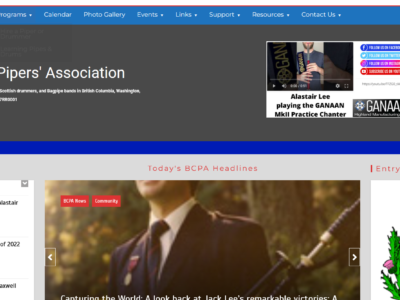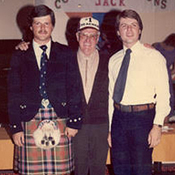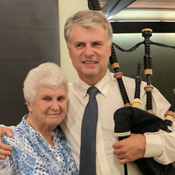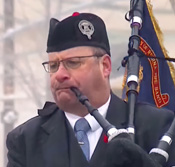Some Reflections on the Piobaireachd Club.
2007
The Piobaireachd Club was formed in the fall of 1990 under the auspices of the B.C. Pipers’ Association. The first musical evening was held on February 1, 1991 at the home of Jack Lee. Junior-Piper-of-the-Month Alan Bevan launched the proceedings with Lament for Ronald MacDonald of Morar. Piper-of-the-Month Jack Lee followed with Lament for the Children.
Over the years, 123 different piobaireachd have been played, not including all of the cèol mor played by visitors coming to Vancouver as judges or on a holiday. The most frequently played tunes are the Lament for Mary MacLeod (12) and the Battle of Auldearn (11).
The founding members of the club were Peter Aumonier, Duncan Fraser, Jack Lee, Ron MacLeod and Ron Sutherland who instigated the developmental meeting. It was agreed that the setting should be such that players would be encouraged to relax and put a little of themselves into the music without, of course, offending teaching and traditions.
The founding guidelines were clear on some points which, on reflection, have contributed to the durability of the Club. Earlier attempts at creating a Club had seldom lasted a season before fading into a faint memory.
1. It was agreed at the outset that the purpose of the Club would be to provide a relaxed, non-competitive setting where pipers could play to a supportive audience. There would be no judging and no critique of the play.
As an introduction, if they so chose, pipers would be free to talk about the history of a tune or of the style they were presenting. For example, when Jack Lee played a tune in the MacArthur/MacGregor style for the first time, he gave a short, lucid explanation of what to expect when he played that delightful lyrical song, Lady Margaret MacDonald’s Salute. Hugh Aird did a similar thing when he played the Old Woman’s Lullaby in two different styles.
Post-play commentary would be limited to discussion of a style, a situation that has only arisen after a demonstration of contrasting styles. The focus of any discussion would be on the music in a way that is non-judgemental about the presentation. In actual practice what has occurred is that most of the discussion is an informal exchange between pipers in the intervals between the playing of the great music.
2. It was agreed that there would be a Piper-of-the-Month and a Junior-Piper-of- the-Month with meetings limited to four or five nights over the fall and winter months in recognition of the busy schedule that many pipers have.
Teachers would be encouraged to have their pupils play in a home setting where the youngsters would perform before an uncritical audience and without the stress of competition. It has been interesting to watch the development of young players, some of whom start out playing the ground only, then advancing the next season to ground and variations and finally to a complete tune. Some of the youngsters present at the Club’s inception (Alan Bevan, Jori Chisholm and Colin Clansey, for example) now compete at senior events in Scotland.
3. The theme was and remains: bring pipes and play to your heart’s content. Many of the pipers, amateur and professional, like to try out the tunes they will be playing in an upcoming competition. Some only play the ground and variations to test a new tune they are learning –- it is left to the piper to decide what he/she will play, except for designated Pipers who are expected to play a complete piobaireachd.
4. Ron Sutherland was appointed as convenor to organize the meetings. Regular Club meetings would be held in a home setting. The host to supply coffee, tea, and goodies; the Club to provide beer and liquor which would be sold at a price to cover replacement and mixer costs, with a small surplus to pay for postage.
The convenor signs up members and collects a $5.00 fee. Over the years, this fee has been levied twice but may never be collected again as all but two of 81 members now use email.
5. Ron MacLeod was appointed secretary to keep records of postal and email addresses. The secretary sends out meeting notices and writes a report on meetings. This report is circulated by email to members, carried in the BC Pipers’ Newsletter, and is available on the Association’s website.
The founders believed that reporting is critical to continuity and bringing in new members. It was also seen as a means of spreading the word about piobaireachd. A meeting report covers the venue and host, who played what, and a story based on fact and/or heather myth about one or more of the tunes played. No editorial comment about the quality of play, which can range from the abbreviated efforts of a raw beginner to an inspired rendition by a Master such as Jack Lee.
Youngsters are encouraged to come out and play. And come they do. The pre-Christmas meeting is dedicated to the youngsters, with a table loaded with food delights and free juice and soda pop. As many as 11 youngsters have turned out, coming from as far away as Alaska and Seattle, Washington. To observe progress year on year is a marvellous experience. Most importantly, the youngsters have a chance to get to know each other in a non-competitive setting. Invariably, a senior member will close the evening with a rendition to thrill the heart and mind.
If there are practical reasons for the Club’s durability, they can include: having a convenor; issuing a meeting report; and, having a dedicated cadre of professionals who step up willingly when called on by the Convenor to be Piper-of-the-Month and who encourage their pupils to bring their pipes and and play for the joy of it. Moreover, the absence of a formal structure with all its appurtenances has added to the informality, an important ingredient in creating a relaxed ambience for pipers and audience.
The informality of a home setting has proven to be very important. A home setting facilitates sociability and helps participants keep a focus on the recreational and entertainment aspect of the music. It is a setting in which the great music can be heard and enjoyed for its own sake.
An opportunity to listen to good music played with enthusiasm is the beginning and the end of it.
Membership in the Piobaireachd Club is open to all who wish to enjoy the playing of cèol mor. Contact Ron Sutherland at 604-988-0479, email ronald_sutherland@sfu.ca or Ron MacLeod at 604-538-5709, email jrmacleod@telus.net
Ron MacLeod,
Club Secretary.
